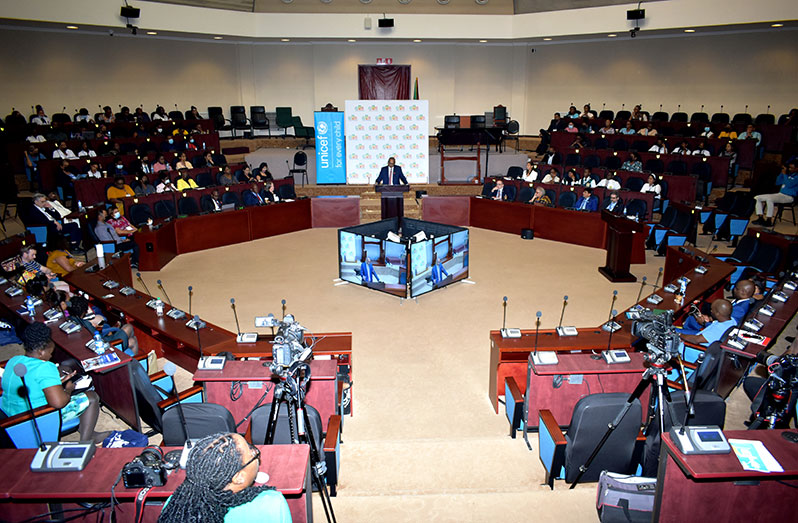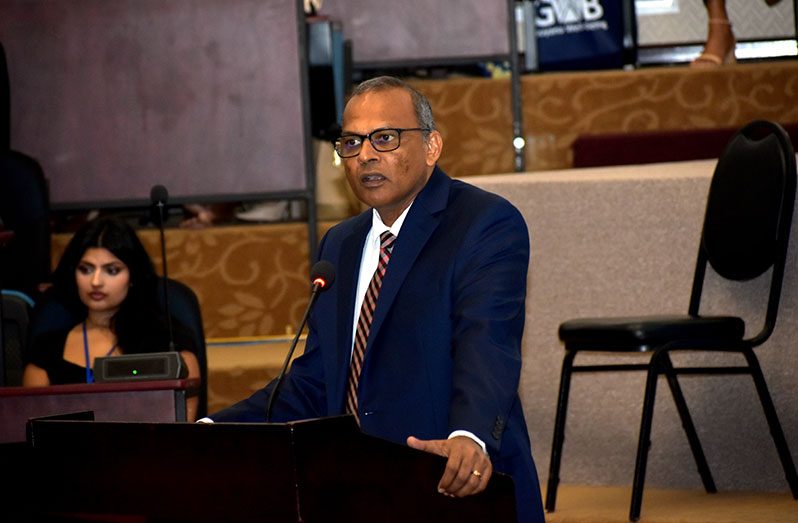–Dr. Anthony reveals more than 20,000 persons estimated to have severe mental illnesses
By Cassandra Khan
MINISTER of Health Dr. Frank Anthony, on Tuesday told participants gathered at the ongoing Mental Health and Well-Being Conference that about 20,000 Guyanese have several mental illnesses.
The Health Minister, who delivered the keynote address at the conference’s opening ceremony hosted at the Arthur Chung Conference Centre at Liliendaal, Georgetown, said that these statistics help to illustrate the dire need for improved mental health care in Guyana.
Beyond those with the severe illnesses, Dr. Anthony said that the 2015 to 2020 Mental Health Action Plan details that nearly 10 to 15 per cent of Guyanese (about 78,000 to 114,500 people) have a mental health disorder.
Evidently, he said, special focus has to be directed towards expanding mental health support and services in Guyana. And he highlighted that some of the much-needed actions have already been initiated.
“We are pleased that, having planned and implemented some parts of the (Mental Health Action) Plan that the Pan American Health Organisation (PAHO) has worked with us to review, we are in the process of revising that plan for the next five years,” Dr. Anthony said.
He added that with new data from coming studies, the new plan would be more responsive to local needs and specific problems as opposed to a “one-size-fits-all” strategy.
“We’ll have to take into consideration some of the new challenges that we have, such as COVID-19 and as you heard with COVID-19, many of the patients that came to us, in some cases they had mental health issues, whether it’s depression, anxiety, and these were the acute issues that we saw,” Dr. Anthony explained.
Beyond conditions they presented with, he said that patients might also develop mental health disorders.
For example, Dr. Anthony said, when some patients are discharged from the hospital, they begin to display “long COVID” symptoms, and present with psychiatric and neurological symptoms.

FOCUS ON CHILDREN
Another neglected area that demands greater focus is children’s mental health.
“Today, we have millions of children affected by neurodevelopmental disorders, which include intellectual development disorders, communication disorders, autism spectrum disorders, attention deficit disorders, hyperactivity disorders, and so forth,” he said.
In Guyana, many of these disorders have been underdiagnosed, Minister Anthony disclosed.
He said that over the last year, two of their child psychiatrists were not just operating in Georgetown, but they have also been able to extend clinics now to Regions Three (Essequibo Islands-West Demerara), Four (Demerara-Mahaica), and Six (East Berbice – Corentyne).
It is expected that in subsequent years, the local health authorities will be able to extend these child psychiatry clinics to all of Guyana’s regions.
One area where marked successes have been recorded, however, is Guyana’s legislative framework for health. And mental health has been a priority, Dr. Anthony said.
Two pieces of legislation, specifically dealing with mental health, were passed in two years. The first is the Mental Promotion and Protection law and the Suicide Prevention law.
Minister Anthony explained that these laws replace archaic mental health ordinances that viewed patients with mental health illnesses as a threat to society instead of affording them adequate support and care.
“Our current legislation reverses that process because we want to see people spend as little time in hospitals as possible. Indeed, when they have an acute episode, then the place for them to be is probably in the hospital. But once we are able to treat them and help them overcome that acute episode, then the best place for them to be is at home and closer into their community,” Minister Anthony said.
He added: “There should be no discrimination against mental health patients, which is one of the things that many mental health patients confront on a daily basis.”
The Health Minister said that sometimes people may have someone with a mental health disorder in their family, but they don’t report it because they are afraid of the nation, then the person ends up not receiving help.
“All of that is now protected under this legislation to allow a lot more flexibility and to help patients to get the care that they deserve,” he said.
Dr. Anthony added: “So that, in many instances, prevented people from reporting these cases and therefore, with this new legislation that we have passed, we have now decriminalized attempted suicide in our country.”
GREATER SUPPORT
With some strides made, the Health Minister highlighted that the local authorities and other stakeholders are working on a comprehensive programme to provide care across the spectrum of services that they are delivering. Through this programme, primary health care physicians at health centres across the country will be trained to identify basic mental health problems.
The new Suicide Prevention Commission, catered for in the new Suicide Prevention law, is also expected to determine new plans and programmes to address mental health care in Guyana. Once mental well-being is promoted, he believes that Guyana’s worrying suicide rates will decline.
“This is a societal problem and the only way that we can work on reducing the burden of suicide is if every one of us work together. Every sector in society must work together and by doing that, we will be able to reduce these numbers,” Dr. Anthony emphasised.
He said that along with medication and cognitive behavioural therapy, working with the family with helping in harm reduction, and so forth, they believe these combinations of methods would certainly help to reduce suicide in Guyana.
“We have a collection of data and we want to pivot the service so that the places where we are seeing suicide, we must be more responsive in those areas. We can’t have a unit operating out of Georgetown, when the cases that we are seeing are in the regions,” Dr. Anthony related.
He added that they have to decentralise the response to make sure that they are actually going to the places that are most affected.
This mental health and well-being conference, now in its second edition, was crafted in response to the worrying suicide statistics for Guyana and the need for greater mental health interventions.
Local, regional and international stakeholders are all gathered in Guyana to assess strategies already employed, and determine what else can be done to support the thousands of people contending with mental health issues.




.jpg)









